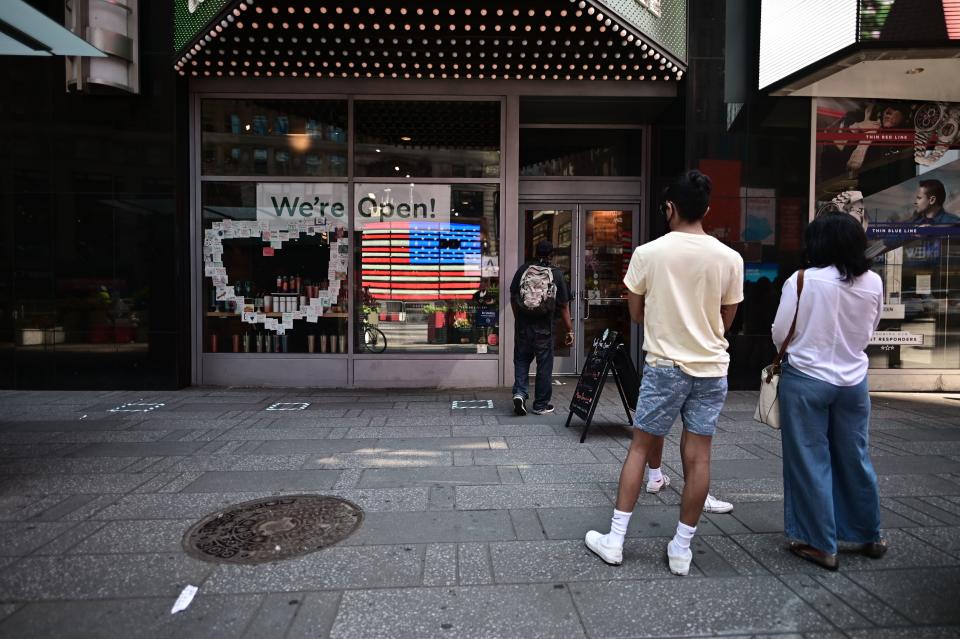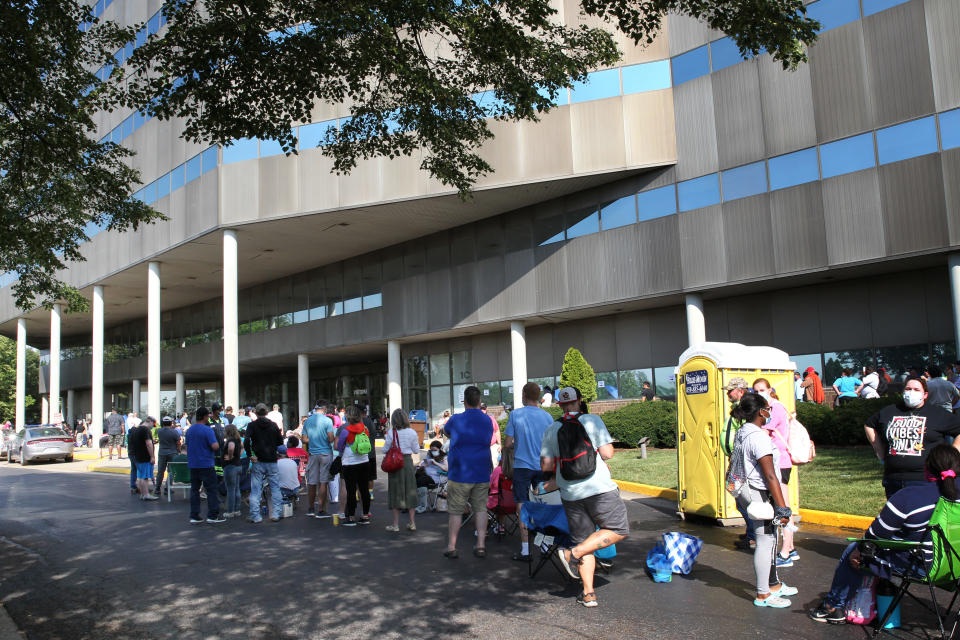Government eyes back-to-work bonuses to persuade employees to return in pandemic
As critics worry that expanded unemployment benefits during the pandemic are keeping people from returning to work, one state is offering a monetary bonus for workers who get back on the job.
The incentive strategy is getting attention from GOP lawmakers and the White House as they craft another stimulus package, but experts warn that incentivizing people to return to work while the public health crisis continues could be dangerous.
Full-time workers in Idaho who lost their jobs on or after March 1, but go back to work between May 1 and July 1, will get a one-time bonus of $1,500; part-time workers will receive $750. The payments are funded by $100 million of the $1.25 billion the state received in federal rescue money.

The initiative is on a first-come, first-serve basis, and state officials estimate that 70,000 workers could get a payment. The goal is to help persuade workers to get back on the job and help jumpstart the state economy.
“I think people are ready to go back to work,” Gov. Brad Little said on June 12. “Now is the time for us to provide Idahoans with the financial incentive to return to work and ensure our economic rebound is swift and robust.”
Will there be a nationwide back-to-work bonus?
Similar initiatives are being proposed for the entire country. President Donald Trump’s administration and some Republican lawmakers have signaled support for nationwide bonuses for returning to work.
White House economic adviser Larry Kudlow, who described the additional $600-a-week in unemployment benefits as a "disincentive” and “paying people not to work,” said that they’re looking at such an initiative.

"The president is looking at a reform measure that would still provide some kind of bonus for returning to work," Kudlow told CNN on June 14. “But it will not be as large, and it will create an incentive to work.”
Republicans are expected to begin negotiating a new package in July. The $3 trillion HEROES Act that passed the Democrat-controlled House of Representatives in May and included an extension of the unemployment benefits has been put on hold.
Read more: How to file for unemployment insurance
Republican Senators have proposals for such bonuses including two prominent ones: a $450-per-week bonus for returning workers and a $1,200 incentive payment.
$450 a week
Senator Rob Portman (R-OH) proposed the $450-a-week incentive for people returning to work.
“That bonus, I've suggested could be for $450,” Portman said during a Senate Finance Committee Hearing on June 9. “Anybody on minimum wage would be able to go back and make just as much, if not more, in the private sector than they could make on UI if they had this bonus.”
Read more: What to do before you lose your job
His proposal is for this incentive to last six weeks, meaning workers returning to work would get up to $2,700 added to their salaries. The proposal only provides the bonus to those who return to work before July 31, when the additional unemployment benefit of $600-per-week expires.
$1,200 bonus
Ways and Means Republican Leader Kevin Brady (R-TX) introduced the Reopening America by Supporting Workers and Businesses Act of 2020, which includes turning unemployment benefits into a back-to-work bonus of $1,200.
“Unless we can reconnect these workers with these Main Street businesses soon, that business may no longer be there,” Brady said in a statement. “This proposal is an important part in preventing a prolonged recession.”
In response to the U.S. unemployment rate dropping in May — surprising many economists — Brady said that the priority should be to keep the tens of millions of job losses from going permanent “by redesigning the CARES Act emergency unemployment benefit so it doesn’t continue to act as a barrier to getting people back to work.”
Similar to Senator Portman’s proposal, workers will get the bonus on top of their wages if they return to work before July 31.
‘It's based on a flawed premise’
The proposals of back-to-work bonuses have been getting more traction since the unemployment rate in May fell to 13.3% from 14.7%, but experts said the unemployment rate is still very high and it has actually been growing for Black and Asian Americans.
Read more: Workers rights: Here's how the new coronavirus legislation protects you
“The unemployment for African Americans went up; the unemployment rate for Asian Americans went up,” said Gbenga Ajilore, senior economist at the Center for American Progress, a non-profit for public policy research and advocacy. “When you say unemployment went down, what you're doing is you're ignoring a significant portion of the population who have always been left behind.”
While the proposals for back-to-work bonuses are viewed as a way to incentivize people to return to work, there is the risk of returning to work while the public health threat is still high.

“I have a problem with the policy because it's based on a flawed premise,” Ajilore said. “It's based on the premise that people don't want to go to work, because they're getting benefits to stay at home.”
But people shouldn’t want to go to work while there’s an ongoing public health crisis, according to Ajilore. If returning to work means risk of exposure to the coronavirus and to the employee’s health, not going back to work should be encouraged, Ajilore said.
Another question the back-to-work bonus doesn’t address is what happens to those who are already back at work and have been exposed to the virus.
“What you're doing is, you're dividing groups of people instead of giving everyone money to stay at home to stay safe,” Ajilore said, “while we combat the public health crisis.”
Denitsa is a writer for Yahoo Finance and Cashay, a new personal finance website. Follow her on Twitter @denitsa_tsekova.
Read more:
Rich Americans' pullback in spending is hurting the economic recovery
Read more personal finance information, news, and tips on Cashay
Follow Yahoo Finance on Twitter, Facebook, Instagram, Flipboard, SmartNews, LinkedIn, YouTube, and Reddit.

 money
money 

